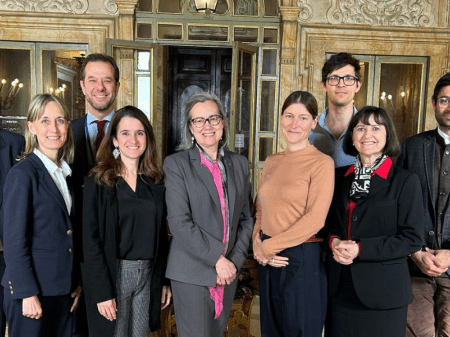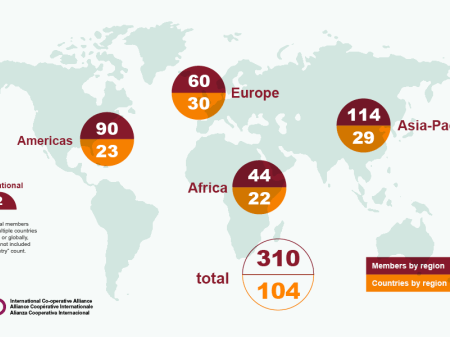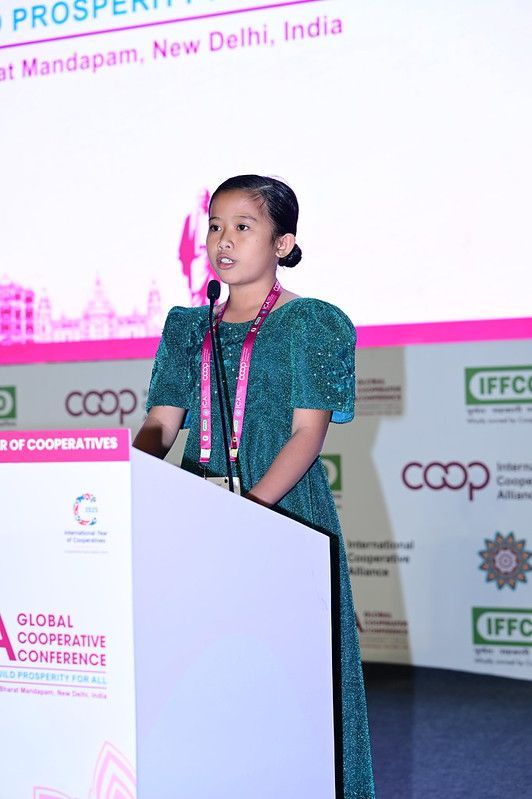
The 33rd World Cooperative Congress, with the theme Deepening Our Cooperative Identity, initiated a consultative process to explore cooperators’ understanding of the Statement and to examine how well it has stood the test of time.
The ICA Global Cooperative Conference served to further discuss how to reaffirm the cooperative identity, using insights from the consultation.
Plenary Address and Worldwide launch of the book Cooperatives in Action: Enterprises with Principles and Values that Change the World
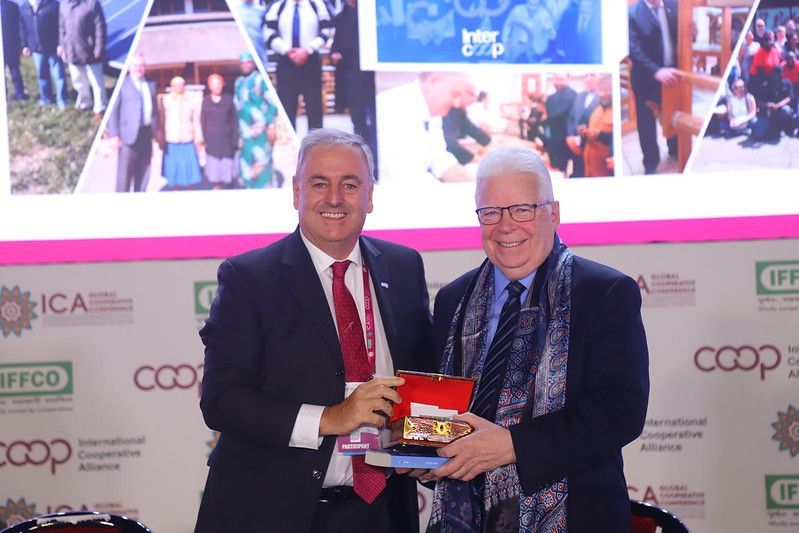
Dr Ariel Guarco, ICA President, set the scene for the conversation by announcing the release of his book Cooperatives in Action: Enterprises with Principles and Values that Change the World.
The book’s presentation was followed by an address by Ms Kendra Pristin, a young cooperator from the Philippines, who is a member of the Aflatoun-NATCCO youth programme run by DCCO Youth zone laboratory cooperative.
She explained how the NATCCO network had partnered with Aflatoun to promote cooperatives in schools. She also highlighted the importance of savings from a young age, adding that Aflatoun organises fun activities and events to learn new skills and make new friends. “My teachers had a significant impact on me”, she said.
The plenary featured two panels - the first exploring perspectives from the ICA Consultations on the Cooperative Identity and the second focusing on the practical dimensions of the cooperative identity.
Panel III.A Perspectives from ICA Global Consultations on the Cooperative Identity

During the panel discussion, Ms Alexandra Wilson, ICA Board Member and Chairperson of the ICA Cooperative Identity Advisory Group, highlighted some of the key findings from the ICA Global Consultations on the Cooperative Identity. She also shared Canada’s experience, adding that cooperators who joined in the consultation discussions were very interested and engaged in the process.
The panel included cooperators from different regions, who shared their vision of the cooperative identity.
Mr Doug O’Brien, President/CEO, National Cooperative Business Association (NCBA-CLUSA), said the consultation had created an opportunity for his organisation to start important conversations with members, communities and other organisations. Mr O’Brien also spoke about the importance of advocacy and learning. “We learnt there is a level of appreciation and understanding of the cooperative identity, but that level of understanding isn't that great,” he said, adding that his organisation would focus on improving engagement with the cooperative community in the United States and ensuring co-ops feel part of the conversation.
The 2026 ICA Congress will provide the opportunity for deeper engagement and more comments around the identity, he added.
Mr Hyunha Kim, Head of Policy Planning Team, iCOOP, offered his country’s perspective on the importance of the cooperative identity.
“True power of cooperatives comes from the association of people,” he said.
Ms Maria Eugenia Perez Zea, Chair of the Board of Directors of the Coomeva Cooperative Business Group, Colombia, highlighted the importance of the statement as a “fundamental pillar” when it comes to raising awareness about cooperatives, particularly among government and public sector officials. She added that the identity is key to showing the difference between cooperatives, as people-centred enterprises, and other businesses. She also warned that when cooperatives forget about this people-centred dimension, they lose their members.
The cooperative apexes in Japan and Italy also used the consultation to engage their movements into a deep conversation about identity.
Ms Francesca Ottolenghi, Chief of International Relations, Internationalisation and Development Cooperation, LegaCoop Nazionale, Italy, explained how her organisation adopted a two-stage approach to the consultation. The first was to have informal, participatory discussions with cooperators across the country. The second was to ask cooperators to express their views on the cooperative values and principles. This process led to the introduction of a new cooperative value of sustainability in 2024, which calls for protecting the planet from an intergenerational perspective.
Mr Kenki Maeda, General Manager, Department for Cooperation among Cooperatives, Japan Co-operative Alliance (JCA), said the consultation was an opportunity to understand what Japan’s cooperatives want for the future. One of the main findings of these discussions was that members believed the cooperatives needed to be more engaged in the local communities, particularly in the context of an ageing population.
The session was followed by a presentation of Dr Ariel Guarco’s book, which highlights how cooperative principles can be put into action. It showcases 28 cooperative case studies, from large cooperatives to small ones.
“For things to transcend you have to write them down”, said Dr Guarco.
The book looks at how cooperatives face global challenges, co-producing and consuming in a responsible manner, being there for their members and communities, providing people-centred technology, and fostering the inclusion of disadvantaged groups.
“The cooperative identity gives us the tools to produce a different society, to transform it to ensure a more inclusive world, where no one stays out or behind,” he said.
He added that the book was edited by a cooperative, published by another cooperative and translated by another cooperative.
Martin Lawery, who prefaced Dr Guarco’s book, praised him for his commitment to the cooperative movement and argued that cooperatives present solutions to global challenges.
“If we truly believe we can start to make a real difference in that trajectory, I think all of us are on board,” he said.
Panel III.B Living Our Cooperative Identity
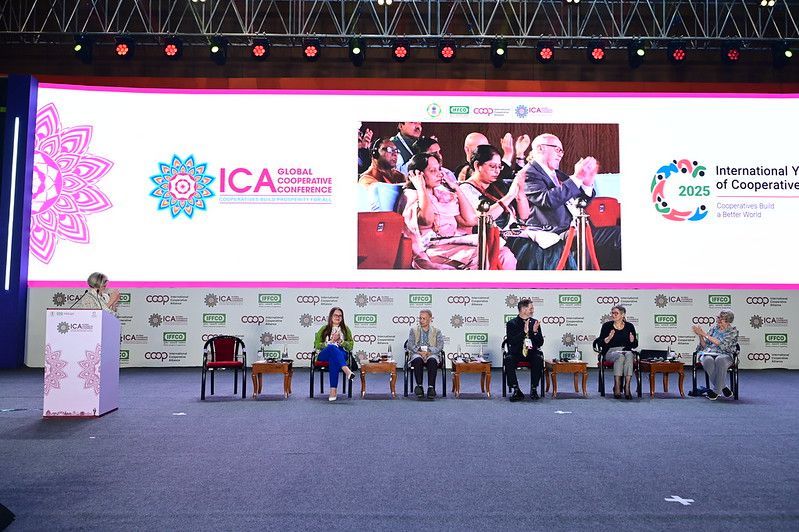
The second panel explored the practical dimensions of the cooperative identity in the current global context.
Moderator Melina Morrison, who is the CEO of the Business Council of Cooperatives and Mutuals (BCCM) in Australia, emphasised the importance of this conversation in response to rapidly shifting economic, environmental, and political realities. The session focused on how cooperatives can stay true to their values while adapting to new challenges.
Ms Aicha Errifaai, the Director General of the Office for Cooperative Development (ODCO) in Morocco, outlined several challenges cooperatives face when it comes to upholding their identity, such as staying true to their mission as they scale, the misuse of the cooperative label by businesses seeking tax or regulatory advantages, and the growing disconnect with younger generations. To address some of these, she recommended establishing strong legal frameworks that define cooperative identity, having government oversight to ensure genuine cooperative practice, vetting firms converting to cooperative structures, and having regular internal reviews of cooperatives’ adherence to their values and principles. She also argued that incentives should be provided to cooperatives that authentically embody cooperative principles and that the Sixth Cooperative Principle, cooperation among cooperatives, can act as a safeguard for cooperative identity.
Mr Satish Marathe, a representative from India and a member of the G20 Working Group on Cooperatives, highlighted the sector’s role in promoting sustainable development. He called on cooperatives to avoid excessive consumption of natural resources, encourage prudent use of infrastructure and services, promote low-emission, sustainable lifestyles, ensure livelihoods while advancing environmental responsibility, and mobilise cooperative networks to act collectively and urgently.
Mr Erbin Crowell, Board Member, NCBA-CLUSA and Executive Director of the Neighboring Food Co-op Association (NFCA) referred to the importance of embedding cooperative identity into law and policy. He also gave the example of the successful passage of a resolution in the U.S. that safeguards the legal identity of cooperatives, preventing misuse or misrepresentation of the cooperative model. He concluded by calling for an enabling legal environment that protects cooperative values and ensures that identity is more than a label.
Ms Anne-Laure Desgris, co-CEO of Smart in Belgium, described how her cooperative aligns its mission with the cooperative identity through inclusive and democratic practices. She mentioned initiatives such as multilingual workshops that make cooperative education more accessible and the implementation of high-standard democratic decision-making processes that reinforce member control.
Ms Ann Hoyt, Professor Emerita at the University of Wisconsin-Madison and long-time cooperative leader, reflected on the role of cooperatives in promoting peace. She argued that cooperative values such as equity and equality are central to social cohesion and that cooperatives are promoters of hope due to their role in enabling fair participation and building trust. She explained that while principles guide action, it is the underlying values that give cooperatives their ethical power to be agents of peace.
In her concluding remarks, Melina Morrison reiterated the need for deep and practical engagement with the cooperative identity.
Main photo: Ms Kendra Pristin, a young cooperator from the Philippines


